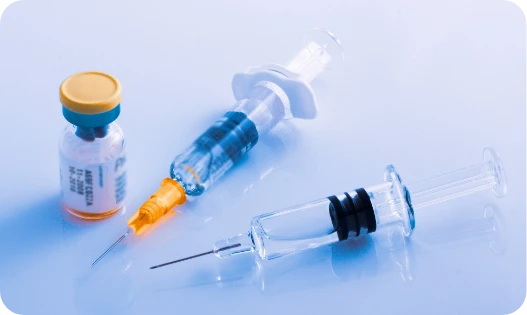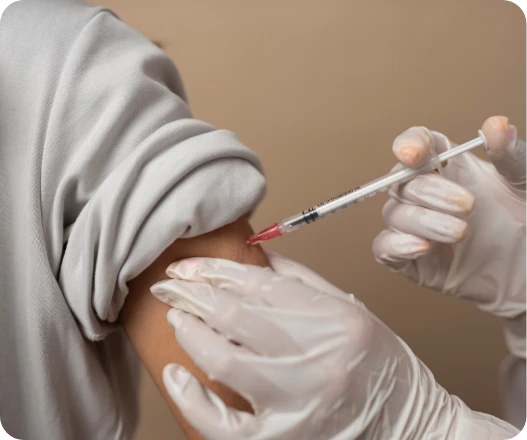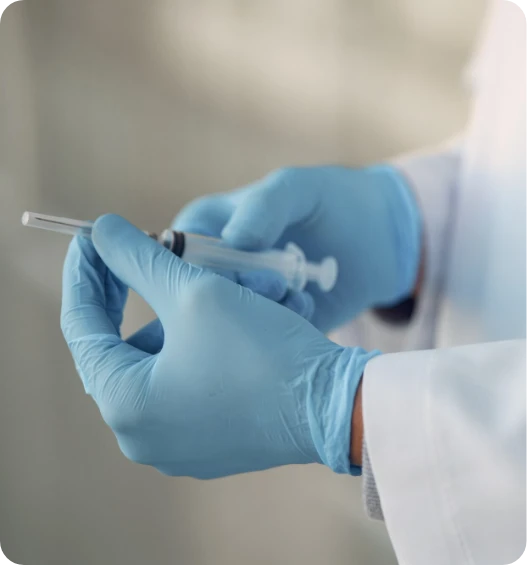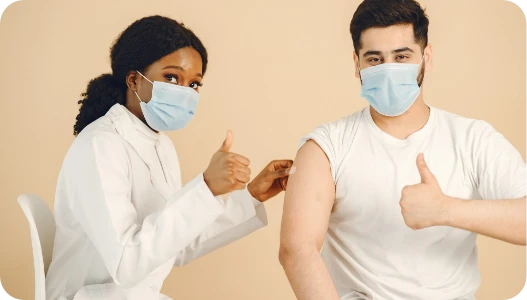Immunization

Vaccines confer active immunity against harmful pathogens by stimulating and strengthening the immune system of the body to kill the foreign agents. Vaccines activate the antibody-producing cells called B lymphocytes, that remain sensitized and whenever the same pathogen enters the body, they get activated and perform the phagocytic activity. Vaccines also confer passive immunity by providing antibodies or lymphocytes obtained by an animal or a human source.
How Do Vaccines Work?
Vaccines prepare our bodies to defend itself against pathogens such as viruses or bacteria. A vaccine contains a very safe amount of attenuated or killed viruses or bacteria. The immune system gets activated and recognizes the pathogens as foreign antigens and produces corresponding specific antibodies against it. Some of the memory cells are also produced to store the information for future use. Now, whenever that specific pathogen attacks the body, the memory cells get activated and a strong and immediate response is produced.


Currently, four different types of vaccines are available. These include;
- Live virus vaccines that contain attenuated viruses or bacteria. Examples include (measles, mumps, rubella) MMR and varicella vaccine.
- Killed or inactivated vaccines that contain cellular proteins derived from viruses or bacteria. For example, the whooping cough vaccine: (Tdap)
- Toxoid vaccines contain a toxin or antigen that produced the pathogenic substance. They provide immunity against the harmful effects of infection. An example would be the diphtheria and tetanus vaccine: (Tdap)
- Biosynthetic vaccines are the synthetic manmade vaccines that are produced by genetic engineering and biosynthetic technology. The hepatitis B vaccine is an example of biosynthetic vaccines.
Vaccination Schedule
The recommended vaccination schedule approved by the US Center for Disease Control and Prevention (CDC) should be followed by Primary Care physicians.
Importance Of Vaccination In Children
Many fatal and life-threatening diseases affecting children can be prevented by vaccinations. These include diphtheria, tetanus, pertussis, type B influenza, hepatitis B, polio and pneumococcal disease.


Vaccine Schedule For Teens
A teenager should go to the doctor once every six months. It can be a great substitute for any vaccines missed in their early teens or childhood.
Vaccination For Adults
Adults need a variety of different vaccines based on their requirements and lifestyle. These include the HPV vaccine (it confers immunity against cervical, anal and other types of tumors and genital diseases), seasonal flu vaccine, meningitis vaccine, and others.
Vaccinations For The Elderly
People above 60 years of age have special requirements and need immune shots to strengthen their immune system. The seasonal flu vaccine, pneumococcal vaccine, and Td or Tdap (tetanus, diphtheria, and pertussis) are usually prescribed to the elderly by a Primary Care physician.
Pre-teen Vaccines
For pre-teens, the following four vaccines are recommended.
- Meningococcal conjugate vaccine
- HPV vaccine
- Tdap
- Flu vaccine
Risks Of Vaccine Reactions
Just like any other medicine, there is a probability that the body may react against the vaccine and there is a chance of possible side effects. These reactions are usually mild and not very serious. Symptoms include tenderness, swelling, and redness at the site of injection, pain, and mild fever. These symptoms appear soon after the shot is given and go away within a few days on its own. Reactions have been reported against polio, hepatitis B and Hib vaccines, but are very rare.
Please do also check our other health care services in New York: Anxiety Depression Treatment | Allergies Prevention Treatment | Infections Illnesses Prevention Testing | Vaccination Immunization | Weight Management Counseling | Std Testing | Physical Exam Center Work | Tlc Blood Test | Sleep Apnea Testing | General Ultrasound | Vascular Ultrasound | Pulmonary Function Test | Nerve Conduction Study | Electromyography | Electrocardiogram | Echocardiogram | Autonomic Testing |Insomnia Testing






